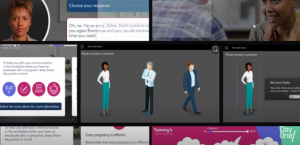When you’re looking to implement or modernise online learning for training your staff, there will often be a choice between generic, off the shelf courses and bespoke elearning development.

So how do you choose which is right for you, and once you’ve done that, how do you choose the best supplier to meet your needs?
Difference Between Off-the-Shelf and Bespoke eLearning
What is Off the Shelf Content?
Sometimes called ‘Generic’ or ‘Ready-to-Go’, Off the Shelf content has been developed to be useful for a relatively large user base across multiple organisations. The focus is a certain area of knowledge or skill that could be relevant to multiple customers.
Just because it is off the shelf now, it doesn’t mean that the production process was cheap – it may have been developed with considerable time, effort, skill and budget. The reason it can be sold at lower cost per course is purely down to economies of scale – the production costs can be more than recouped by selling the content to a mass audience.
What is Bespoke eLearning?
Bespoke eLearning content is developed solely for the needs of the purchaser and often takes into account not only the subject matter of the training, but the unique working practices, IT systems, and even branding of the organisation.
This means that bespoke elearning can help the learner to not only further their knowledge of the topic, but develop a greater understanding of how it is implemented within their organisation.
By customising elearning content to your brand, it will also feel much more bespoke to your needs and become part of the internal branding experience – less of a box-ticking exercise. This can be especially important during the onboarding period where you want new recruits to be as immersed and engaged as possible in your culture.
Identifying Your Needs
Whether generic or bespoke elearning is right for you depends on many factors. There isn’t one ‘best’ solution. The right solution may not just differ from company to company, but between departments or even between various training programmes within a department.
There is a perception that generic / off the shelf is synonymous with cheap, and that bespoke is automatically expensive.
It’s true that bespoke elearning development will often involve a higher upfront cost. However, that short-term higher price may bring cost-saving benefits over the medium to long term if:
- You are able to customise the content according to your needs as they change
- The higher level of relevance and specificity to your needs reduces time to competence and / or improves learning outcomes, bringing a greater training ROI to your business.
- You have a large number of learners – you own the IP of the content, so can roll it out to as many users as you like, while generic content is generally licensed on a per-user basis.
Conversely, the short term cost-savings from generic courses may be outweighed down the line by the need to buy further training if your organisational or regulatory environments change, if multiple courses need to be bought in order to fulfil your needs, or if their lower levels of relevance bring less learner engagement and less efficiency because the content comes with certain caveats situational to your business – both of which can greatly reduce your elearning ROI.
Consider Off the Shelf Courses if:
- you need general training in a popular topic that isn’t specific to your organisation, such as Health and Safety, Food Hygiene, IT and Computer Skills – (like Microsoft Office for example), Data Protection or Soft Skills like sales techniques or leadership and management principles. Anywhere the subject matter expertise has already been sourced and your personal input isn’t needed
- you need the content available at speed
- you don’t have access to an LMS to deliver the content.
Consider Bespoke Training Content if:
- you need to train your staff in a highly specialised topic where generic content is hard or impossible to source
- you need to train a larger learner base and don’t want to pay per user
- you need the content to be specific to your organisation processes or in-house systems, and / or you want it in line with your branding.
Customising Content
Sometimes, you can be confident that the content of a course is not going to change considerably for a long time. For example, at the time of writing, the Food Safety Act 1990 is still in force (albeit with some amendments) and the bulk of its original contents is still relevant for 2025 and beyond.
An elearning course on this topic created 10 years ago would likely still be of value now, and you could simply keep an eye out for any updates from the Government’s UK Legislation website or other trusted sources. Generic elearning courses may have been fine for this topic.
The polar opposite could be a company that is looking to, and likely to, grow or change fast. You have enough staff to need training for onboarding and organisational procedures, but both your working environment and in-house systems evolve from year to year – even if the core nature of your business and certain fundamentals remain the same.
You want that core element to run throughout your elearning content, but at least the situational details could do with a level of flexibility, so that the content can quickly and easily be updated and you needn’t create new versions from scratch.
Future-Proofing
Depending on your in-house resources, you may want to engage an elearning company to develop a bespoke training from scratch, then give you the training and tools for your team to be able to keep it up to date.
If you don’t have the in-house design or technical skills to update content (or if you don’t want the potential distraction), you may want to use an external company to create bespoke elearning for you, to ensure that the materials are future proof in terms of customisation capabilities, and to offer some guarantee of availability to support you with future updates.
Shortlisting Suppliers
When it comes to choosing the best off the shelf elearning provider, you can often benefit from the wisdom of the crowd. A course on a popular topic like Data Protection or Anti-Bribery legislation may have been bought thousands of times from multiple suppliers.
You can use buyer reviews as a strong measure, but then take into account how impressed you are with the design elements that you can preview, quality of any demo content and the importance of the topic your business – all balanced against price.
When it comes to choosing the best bespoke elearning provider for your needs, it can be a little more complicated. You need to develop a little more trust in the supplier as the process is, at least in the short term, more expensive, so you want to avoid any costly mistakes.
That trust can be developed in a few ways:
- How long has the company been in business? If a supplier has only been around for a couple of years – or less – can you be confident that that they have the solidity to ensure that they’ll still be around to cater for your needs by the end of 2025 and years down the line – or even to the end of this project?
- Customer testimonials – do they have visible positive feedback from happy clients?
- Relevance to your needs? Have they worked with similar companies in terms of size or sector?
This last point is extremely important. Some elearning providers have done a great job for smaller clients but find themselves overstretched when it comes to dealing with larger projects and multiple stakeholders with complex or conflicting needs that make project success trickier.
When choosing the best bespoke elearning company for your project, you should try and ensure that you tick as many trust boxes as possible.
Personal recommendations can be a good fast-forward, but there is nothing like demonstrating success for an organisation like yours, in an environment like yours.
As an elearning provider, we’re confident of delivering project success in any area we take on. However, we have our own particular sector strengths – namely Finance, Healthcare, Call Centres, Software, Public Sector / Government and Retail. These are our sweet spots, where we can demonstrate both an understanding of and experience in supporting clients with their needs.
Other elearning companies may have multiple clients in other specific sectors – like Aviation or Mining for example.
Choosing the Best Supplier
Once you’ve created your shortlist, as long as you have been ruthless in narrowing your search down to 3 to 6 potential suppliers, it’s often down to your gut feeling on which supplier is best placed to deliver on your needs.
If the training only needs to impart a standardised level of knowledge for industry compliance, then it may be easy to make a decision on generic elearning courses based on your budget, existing user reviews and confidence from seeing demo content that’s of high enough quality to ensure that your learners will engage with and complete it.
As your decision-making process becomes more complicated, especially when choosing the best bespoke elearning company for your needs, you’ll want to tick the various trust boxes mentioned above and perhaps, especially if you’re accountable to various internal stakeholders for making a good decision, take some level of scientific approach, such as using a balanced scorecard.
Once your shortlist is short enough, talk to those companies – perhaps 3 by this stage – and make sure that you’re comfortable that the points of contact that you’re dealing with directly (not just the company as a whole) demonstrate an understanding or your needs and an interest in supporting you in achieving your goals, rather than pushing their solutions onto your project.


















